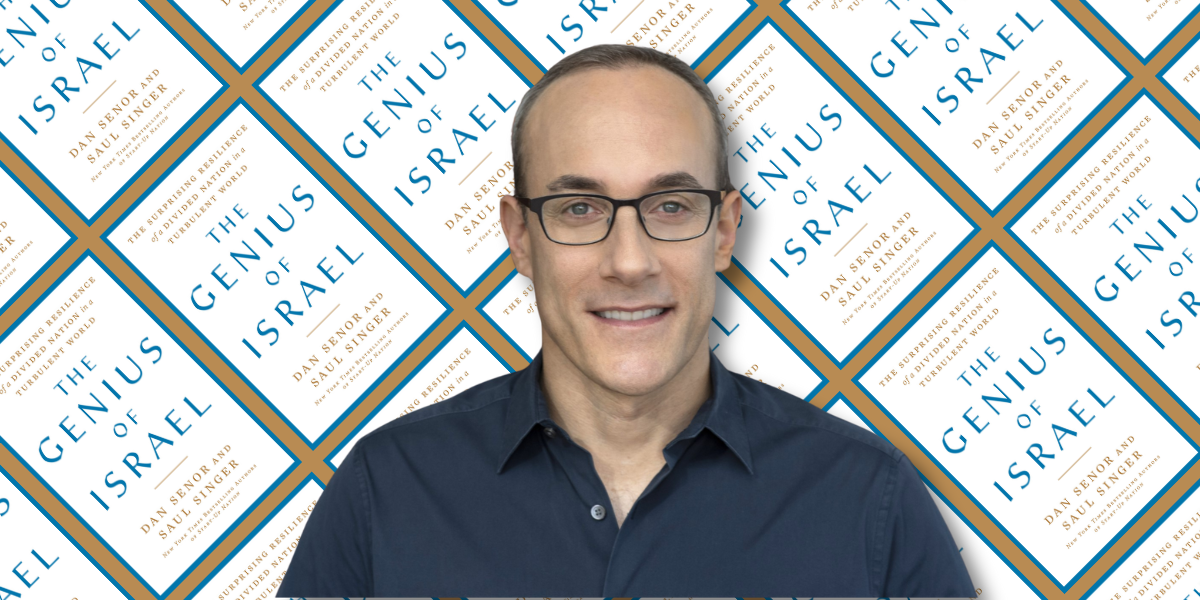Books
Dan Senor on the Secret Sauce Behind Israel’s ‘Genius’

When Dan Senor and Saul Singer set out to write a follow-up to Start-Up Nation, their best-selling 2009 book about Israel’s astonishing economic success, they sought to answer the question of why the Jewish state seems to defy the decline so many developed countries are experiencing in many key indicators of societal health. With their new book, The Genius of Israel, they seek to understand why Israel is moving in the opposite direction.
Although written before the current Israel-Hamas war, the book, subtitled The Surprising Resilience of a Divided Nation in a Turbulent World, seems even more relevant in the post-October 7 era.
The child of a Holocaust survivor, Senor, 52, who lives in New York, has worked as a political adviser, including to Mitt Romney during his 2012 presidential campaign, and as a media commentator. His co-author, Singer, lives in Israel. Senor is also the host of Call Me Back, a weekly podcast about history, politics, the economy and Israel. This interview has been edited for brevity and clarity.
What motivated Saul Singer and you to reunite for this project?
One of the factors that helps explain Israel’s innovation economy is the health of Israeli society and community, the strength of solidarity. This is something we didn’t explain in Start-Up Nation.
As we looked closer, we realized that if you look at a whole range of social-science metrics, Israel is a complete outlier—in the world generally but particularly among Western democracies. All the Organization for Economic Co-operation and Development countries are in a downward spiral, more or less, with demographic crises due to unprecedentedly low birthrates; life expectancy plateauing or dropping; rising deaths of despair, including suicide and substance abuse; and the loneliness epidemic. But not Israel.
So what’s Israel’s secret sauce?
The genius of Israel is the balance between individualism and community: not compromising in pursuit of personal goals and excellence, but at the same time feeling like you’re part of something larger than yourself, whether it’s family, community or country.
From Israeli scouts youth groups and the army to the way religious Jews study in pairs, you’re obligated to the group, not just yourself. In the United States, all the incentives are about how you perform individually. In Israel, you’re rewarded for how you perform as part of a team.
Yet for the last year, Israel suffered immense internal division and now is in a major war sparked by catastrophic military, government and intelligence failures.
We wrote this book during the depths of division in Israel—during the pandemic and the 2023 judicial reform crisis. We were constantly warned: So you really want to write a book about Israeli solidarity when the country is tearing itself apart?
We believed it’s the exact right time because this country has shown repeatedly that just when you think it’s going over the edge it pulls itself back. There have been many such moments: the violent debates over whether to accept reparations from Germany after the Holocaust; the Lebanon War; the 1995 assassination of Prime Minister Yitzhak Rabin; the 2005 Gaza disengagement. We’re reminding people: Hey, Israel is going to be O.K. because it has this underlying social-communal infrastructure that holds this country together.
The response to the events of October 7 validated our thesis because what you’re seeing now is tremendous resilience. The country has come together—religious and secular, Ashkenazim and Sephardim, Israelis from the hedonistic tech mecca of Tel Aviv and those living in struggling towns on the periphery, Israeli Jews and Arabs.
Who is the audience for this book?
One, anyone in the world who’s worried about their own countries or societies in a downward spiral. Maybe Israel has some lessons for you. Two, Jews in the Diaspora who have been distressed about what’s happening, giving them some perspective and hope about why Israel is not just going to be O.K., but how it’s going to flourish.
Uriel Heilman is a journalist in Israel. He works for the Jewish Telegraphic Agency and has written about Israel’s current war for the Los Angeles Times, Salon and USA Today.










 Facebook
Facebook Instagram
Instagram Twitter
Twitter
Leave a Reply